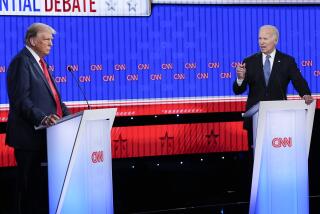A call to reduce fossil fuels, without specifics
Reporting from Washington — President Obama on Tuesday night capped his Oval Office address on the massive gulf oil spill with a call for new efforts to reduce U.S. dependence on oil, saying “the tragedy unfolding on our coast is the most painful and powerful reminder yet that the time to embrace a clean-energy future is now.”
In a bow to political reality and the still-troubled economy, however, he stopped short of spelling out specifics for dealing with a problem that has bedeviled presidents since Richard Nixon in the 1970s and goes straight to the heart of such bread-and-butter issues as consumer prices, jobs and the viability of major industries.
“The one approach I will not accept is inaction,” Obama said.
Yet major changes in energy policy — and attendant policies on climate change — are hard to bring to fruition because they require support from Congress and a broad array of contending interest groups. So far, even modest steps toward energy independence have proved unacceptable.
Case in point: The Environmental Protection Agency said Tuesday that additional fossil fuel costs imposed by an Obama-blessed energy proposal being discussed in the Senate would cut petroleum consumption only 4% over the next 20 years.
And many political analysts say even this proposal is likely to prove unacceptable in an election year.
“Reducing dependence on oil is one of the hardest pieces of energy policy we’ve got,” said Trevor Houser, a visiting fellow at the Peterson Institute for International Economics, who has conducted detailed analyses of energy and climate policies.
“Even with a highly targeted focus on oil, with all the tools we have, it’s going to take decades,” he said.
And the same factors that have blocked past efforts to make major changes in the nation’s dependence on oil and other fossil fuels are still present today, such as potential job losses and higher costs for consumers, at least for the immediate future. Another factor: likely resistance to sweeping changes in the nation’s way of life, such as its reliance on cars.
Environmentalists want the president to use the oil spill as a bully pulpit to push harder on renewable energy sources, such as wind and solar power, while avoiding the environmental costs of such fossil fuels as shale, offshore oil and coal.
Conservatives have advocated more efforts at extracting fossil fuels.
“The United States has over a trillion barrels of oil shale out West. Billions of barrels of untapped oil in Alaska. And more coal and natural gas than we know what to do with,” said Patrick Creighton, a spokesman for the free-market Institute for Energy Research.
“An effective energy policy would treat these homegrown, job-creating energy resources as an asset, not a liability,” he said.
Obama acknowledged those arguments, and brushed them aside as time-worn impediments.
“For decades, we have talked and talked about the need to end America’s century-long addiction to fossil fuels,” he said. “And for decades, we have failed to act with the sense of urgency that this challenge requires.”
He declared he was open to “ideas and approaches from either party — as long they seriously tackle our addiction to fossil fuels,” including strengthening energy efficiency standards and increasing energy research funding.
Obama began by referencing the core principles of his energy proposals as a candidate and as president: legislation to limit greenhouse gas emissions and drive up fossil fuel prices. The House passed such a bill last year. The EPA predicted the effort would not increase gasoline costs enough to significantly curb oil use.
Democratic leaders in the Senate are beginning work this week on a version of their own. It’s unclear how far they will go in stitching the ideas Obama mentioned into a final energy bill, though several Democrats suggested Tuesday that no bill had the 60 supporters needed to pass.
A Senate aide expressed hope that Obama’s speech would launch an aggressive effort by the president and top advisors to line up the votes.
More to Read
Sign up for Essential California
The most important California stories and recommendations in your inbox every morning.
You may occasionally receive promotional content from the Los Angeles Times.










